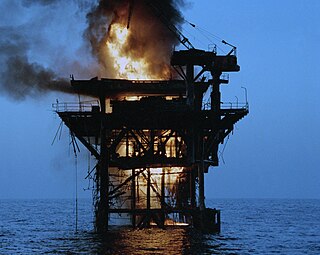
The International Court of Justice, or colloquially the World Court, is the only international court that adjudicates general disputes between nations, and gives advisory opinions on international legal issues. It is one of the six organs of the United Nations (UN), and is located in The Hague, Netherlands.
The LaGrand case was a legal action heard before the International Court of Justice (ICJ) which concerned the Vienna Convention on Consular Relations. In the case, the ICJ ruled that its own temporary court orders were legally binding and that the rights contained in the convention could not be denied by the application of domestic legal procedures.
Customary international law are international obligations arising from established or usual international practices, which are less formal customary expectations of behavior often unwritten as opposed to formal written treaties or conventions. Customary international law is an aspect of international law involving the principle of custom. Along with general principles of law and treaties, custom is considered by the International Court of Justice, jurists, the United Nations, and its member states to be among the primary sources of international law.
The International law bearing on issues of Arab–Israeli conflict, which became a major arena of regional and international tension since the birth of Israel in 1948, resulting in several disputes between a number of Arab countries and Israel.

The Vienna Convention on Consular Relations is an international treaty that defines a framework for consular relations between sovereign states. It codifies many consular practices that originated from state custom and various bilateral agreements between states.
The International Court of Justice has jurisdiction in two types of cases: contentious cases between states in which the court produces binding rulings between states that agree, or have previously agreed, to submit to the ruling of the court; and advisory opinions, which provide reasoned, but non-binding, rulings on properly submitted questions of international law, usually at the request of the United Nations General Assembly. Advisory opinions do not have to concern particular controversies between states, though they often do.

United States of America v. Islamic Republic of Iran [1980] ICJ 1 is a public international law case brought to the International Court of Justice by the United States of America against Iran in response to the Iran hostage crisis, where United States diplomatic offices and personnel were seized by militant revolutionaries.

Operation Nimble Archer was the 19 October 1987 attack on two Iranian oil platforms in the Persian Gulf by United States Navy forces. The attack was a response to Iran's missile attack on MV Sea Isle City, a reflagged Kuwaiti oil tanker at anchor off Kuwait, which had occurred three days earlier. The action occurred during Operation Earnest Will, the effort to protect Kuwaiti shipping amid the Iran–Iraq War.

Stephen Myron Schwebel, is an American jurist and international judge, counsel and arbitrator. He previously served as judge of the World Bank Administrative Tribunal (2010–2017), as a member of the U.S. National Group at the Permanent Court of Arbitration, as president of the International Monetary Fund Administrative Tribunal (1993–2010), as president of the International Court of Justice (1997–2000), as vice president of the International Court of Justice (1994–1997), and as Judge of the International Court of Justice (1981–2000). Prior to his tenure on the ICJ, Schwebel served as deputy legal adviser to the U.S. Department of State (1974–1981) and as assistant legal adviser to the U.S. Department of State (1961–1967). He also served as a professor of law at Harvard Law School (1959–1961) and Johns Hopkins University (1967–1981). Schwebel is noted for his expansive opinions in momentous cases such as Legality of the Threat or Use of Nuclear Weapons, Military and Paramilitary Activities in and Against Nicaragua and Oil Platforms .
The Algiers Accords of January 19, 1981 was a set of obligations and commitments undertaken independently by the United States and Iran to resolve the Iran hostage crisis, brokered by the Algerian government and signed in Algiers on January 19, 1981. The crisis began from the takeover of the American embassy in Tehran on November 4, 1979, where Iranian students took hostage of present American embassy staff. By this accord and its adherence, 52 American citizens were able to leave Iran. With the two countries unable to settle on mutually agreeable terms, particularly for quantitative financial obligations, Algerian mediators proposed an alternative agreement model - one where each country undertook obligations under the accords independently, rather than requiring both countries to mutually adhere to the same terms under a bilateral agreement.

Colombia–Nicaragua relations entail the diplomatic relations between the Republic of Colombia and the Republic of Nicaragua. The relationship between the two Hispanic American countries has evolved amid conflicts over the San Andrés y Providencia Islands located in the Caribbean Sea close to the Nicaraguan shoreline and the maritime boundaries covering 150,000 km2 that included the islands of San Andrés, Providencia and Santa Catalina and the banks of Roncador, Serrana, Serranilla and Quitasueño as well as the 82nd meridian west which Colombia claims as a border but which the International Court has sided with Nicaragua in disavowing. The sea around the archipelago has been under Colombian control since 1931 when a treaty was signed during US occupation of Nicaragua, giving Colombia control over the area. Both nations are members of the Association of Caribbean States, Community of Latin American and Caribbean States, Organization of American States, Organization of Ibero-American States and the United Nations.

The Oil Platforms case is a public international law case decided by the International Court of Justice in 2003 in which Iran challenged the U.S. Navy's destruction of three oil platforms in the Persian Gulf in 1987-1988. The Court affirmed that it could exercise jurisdiction over the case based on the 1955 Treaty of Amity, Economic Relations and Consular Rights between the United States and Iran but decided with strong majorities against both Iran's claim and the United States' counterclaim.
Medellín v. Texas, 552 U.S. 491 (2008), was a decision of the United States Supreme Court that held even when a treaty constitutes an international commitment, it is not binding domestic law unless it has been implemented by an act of the U.S. Congress or contains language expressing that it is "self-executing" upon ratification. The Court also ruled that decisions of the International Court of Justice are not binding upon the U.S. and, like treaties, cannot be enforced by the president without authority from Congress or the U.S. Constitution.
Charles N. Brower is a former State Department official, international judge, and recognized expert in public international law and international dispute resolution. He has been a judge of the Iran–United States Claims Tribunal since 1983. He has also served as a Judge ad hoc in three cases before the International Court of Justice (ICJ) since 2014. He is currently affiliated with 20 Essex Street Chambers in London, UK.
Alan Vaughan Lowe is a barrister and academic specialising in the field of international law. Chichele Professor of Public International Law in the University of Oxford, and a Fellow of All Souls College, Oxford, 1999–2012; Emeritus Professor of International Law and Emeritus Fellow of All Souls College, University of Oxford, since 2012; visiting professor, University of Chichester, 2024.
Bank Markazi v. Peterson, 578 U.S. 212 (2016), was a United States Supreme Court case that found that a law which only applied to a specific case, identified by docket number, and eliminated all of the defenses one party had raised does not violate the separation of powers in the United States Constitution between the legislative (Congress) and judicial branches of government. The plaintiffs, in the case had initially obtained judgments against Iran for its role in supporting state-sponsored terrorism, particularly the 1983 Beirut barracks bombings and 1996 Khobar Towers bombing, and sought execution against a bank account in New York held, through European intermediaries, on behalf of Bank Markazi, the Central Bank of the Islamic Republic of Iran. The plaintiffs obtained court orders preventing the transfer of funds from the account in 2008 and initiated their lawsuit in 2010. Bank Markazi raised several defenses, including that the account was not an asset of the bank, but rather an asset of its European intermediary, under both New York state property law and §201(a) of the Terrorism Risk Insurance Act. In response to concerns that existing laws were insufficient for the account to be used to settle the judgments, Congress added an amendment to a 2012 bill, codified after enactment as 22 U.S.C. § 8772, that identified the pending lawsuit by docket number, applied only to the assets in the identified case, and effectively abrogated every legal basis available to Bank Markazi to prevent the plaintiffs from executing their claims against the account. Bank Markazi then argued that § 8772 was an unconstitutional breach of the separation of power between the legislative and judicial branches of government, because it effectively directed a particular result in a single case without changing the generally applicable law. The United States District Court for the Southern District of New York and, on appeal, the United States Court of Appeals for the Second Circuit both upheld the constitutionality of § 8772 and cleared the way for the plaintiffs to execute their judgments against the account, which held about $1.75 billion in cash.

Jennifer Gillian Newstead is an American attorney who served as the Legal Adviser of the Department of State.

Alleged Violations of the 1955 Treaty of Amity, Economic Relations, and Consular Rights is the formal name of a case in the International Court of Justice (ICJ). Iran filed a lawsuit with the Hague-based ICJ against the United States, on 16 July 2018, mainly based on the 1955 Treaty of Amity signed between the two sides on 15 August 1955 and entered into force in 1957, well before the Islamic revolution of Iran. Iranian officials alleged that U.S. re-imposition of the nuclear sanctions was a violation of the treaty. Iran also filed a request for provisional measures. In response, the United States asserted that the lawsuit as "baseless" and vowed to oppose it. Almost a month later, the ICJ heard the provisional measures request. On 3 October 2018, the International Court of Justice issued a provisional measures order requiring the United States "to lift sanctions linked to humanitarian goods and civil aviation imposed against Iran."

Certain Iranian Assets is the formal name of a case in the International Court of Justice (ICJ). The application was lodged by Iran against the United States on 14 June 2016, on grounds of violation of Treaty of Amity, Economic Relations and Consular Rights, shortly after Bank Markazi v. Peterson was decided by the United States Supreme Court. The Iranian case seeks the unfreezing and return of nearly $2 billion in assets held in the United States. The case focuses specifically on assets seized from the Iranian national bank, Bank Markazi. These funds were seized to compensate victims of a 1983 suicide bombing of a Marine Corps base in Beirut, Lebanon, which has been tied to Iran. The attack killed more than 300 and injured many more, including U.S. military members. Iran has argued in the case that, among other things, the United States has failed to accord Iran and Iranian state-owned companies, and their property, sovereign immunity, and failed to recognize the juridical separateness of Iranian state-owned companies.

Marik String is an American attorney, national security expert, and U.S. Navy officer, who served as Acting Legal Adviser of the U.S. Department of State from 2019 to 2021.







